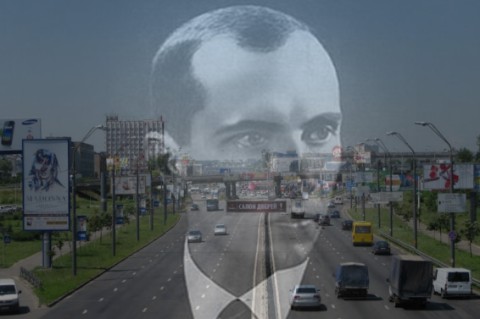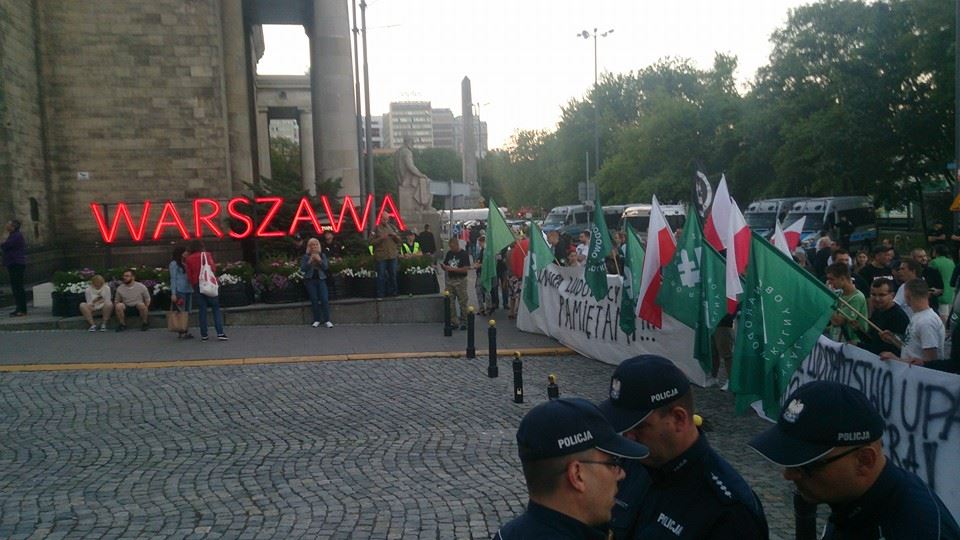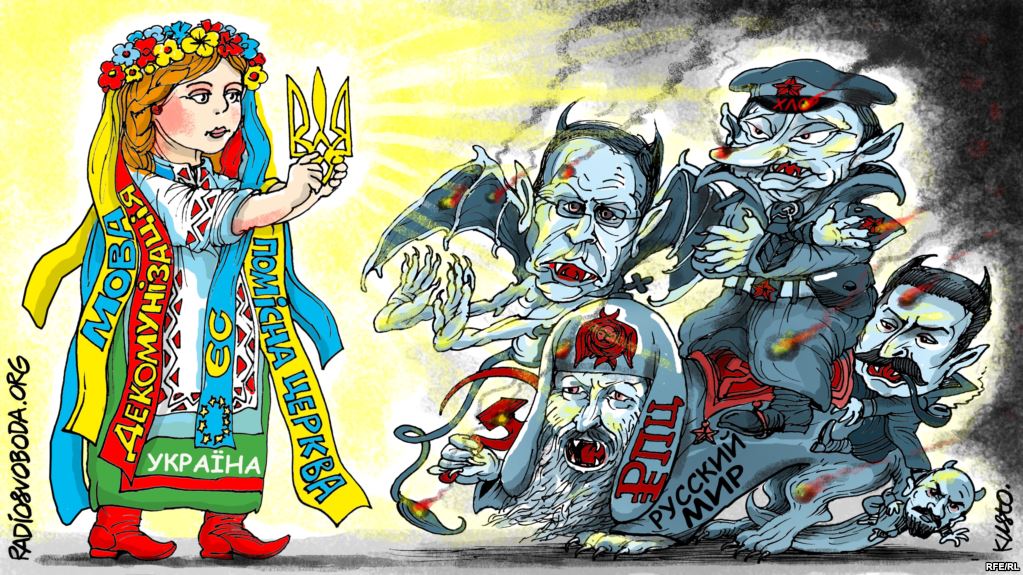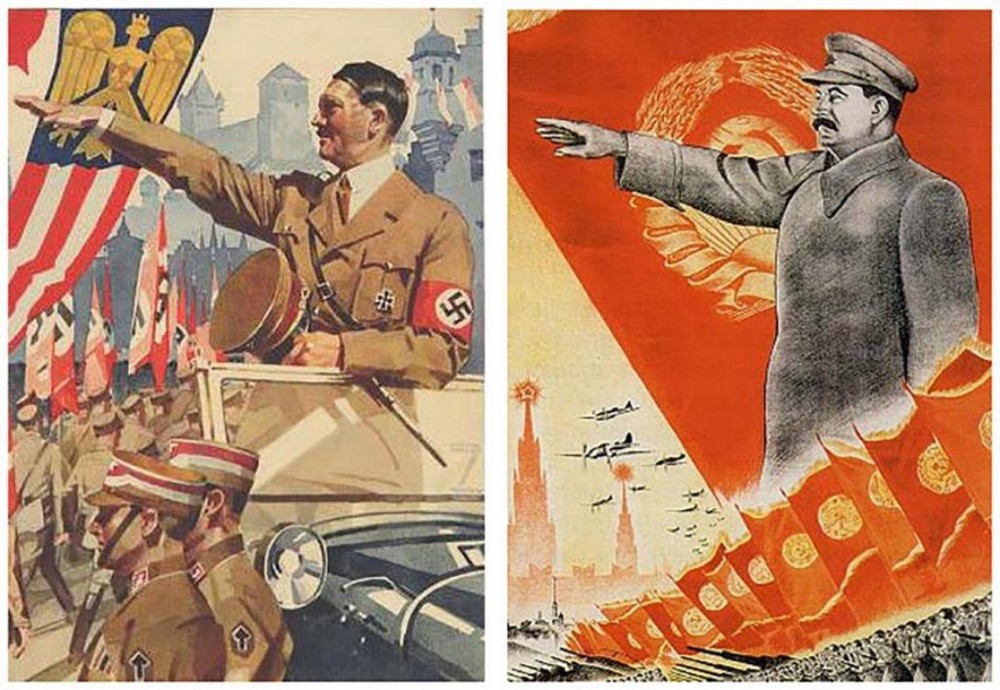On 7 July Kyiv City Council renamed five streets, a lane and an avenue. The last one, in accordance with the law on decommunization, will be no longer called Moskovsky Prospekt, but Prospekt Stepan Bandery. Naming the avenue after one of the most controversial personalities in Ukraine's history, the leader of OUN-UPA Stepan Bandera took place days before Polish Memory Day of the Victims of the Volyn Tragedy. In Poland OUN-UPA members are considered "criminals."
Brotherhood in bad times
On 4 July, Ukrainians received a letter from Poles. Active and former politicians, activists, and media persons responded to Ukraine’s letter of “repentance and forgiveness,” starting their appeal with “Ukrainians, brothers!”.
Forty-five signatories asked for forgiveness for the harm caused by Poles and paid tribute to the victims of Polish-Ukrainian fratricidal conflicts. The letter calls for establishing a „true brothership” of the two nations, in “good, but also bad times, which maybe are coming in our common Europe, endangered by nationalisms and Russian imperialism.”
The letter was signed by Polish intellectuals, namely: former presidents Lech Walesa, Aleksander Kwasniewski, and Bronislaw Komorowski; prominent representatives of the dissident Solidarity movement such as Wladyslaw Frasyniuk and Zbigniew Bujak; former and current politicians such as ex-minister of foreign affairs Radoslaw Sikorski and vice speaker of the Sejm Malgorzata Kidawa-Blonska, as well as editors of the key media outlets.
“Over time, our common misfortune, detachment was replaced by hatred and nationalism, and their bitter fruit - crime - which Poles and Ukrainians together experienced in Volyn, Eastern Galicia, Kholm, Bieszczady and Przemyśl. This is why we are very pleased to receive your letter with significant words "we forgive and ask for forgiveness," where you do not avoid responsibility for the crimes and wrongdoings committed by Ukrainians against Poles in the 1940s,” the letter says.
Prayer for the victims
On the same day, Polish and Ukrainian priests called to pray for victims of Polish-Ukrainian confrontation and not let “the common enemy” separate the two nations. The signatories ask to conduct a memorial service on 10 July during commemoration of the Volyn tragedy.
The letter was signed by Sviatoslav (Shevchuk), the Major Archbishop of the Ukrainian Greek Catholic Church; Eugene (Popovych), the Przemysl and Warsaw Archbishop and Metropolitan of the Ukrainian Greek Catholic Church, and Volodymyr (Yushchak), the Bishop Ordinary of the Wrocław-Gdańsk Eparchy of the Ukrainian Greek Catholic Church.
The religious leaders remind, that Polish and Ukrainian Catholic hierarchs have been meeting and signing joint declarations aimed at preventing the tragic past, in particular, World War II events, serving as a sticking point on the road of Christian coexistence of the two nations.
“For almost 30 years, people of the good will from both our nations want to reach the hearts of all Poles and Ukrainians, to open them for forgiveness and reconciliation. The current moment in the political history of Poland and Europe seems to be especially unfavorable for those, who do not idealize their past. The old enemy of the Polish and Ukrainian nations that can dominion over us only by separating us, aims to open the wounds of the past, provoke a new whirl of tension and hatred between us and destroy our common European future.”
The appeal states, that “each Church that is faithful to its mission must implicitly accept the teaching of the Savior, that before making a sacrifice to God, one must first make peace with the brother that feels aggrieved” (referring to Matthew 5:23-24).
Poles unhappy with Ukrainian version of common history
However, such an unconditional reconciliation-oriented posture is not shared by whole Polish society. Two weeks ago, Michal Dworczyk, Poland’s MP and chief of the parliamentary Commission of Contacts with the Poles Who Live Abroad, presented a response to Ukrainian letter from the Polish ruling party “Law and Justice.”
According to the message, Poles accept apologies of Ukrainians, but find Ukraine’s version of a common history “a problem” and emphasize, that they will not accept “ideology and actions that allow murder of innocent civilians, even in the name of the highest goals, to which undoubtedly fight for state independence belongs.”
A number of Polish journalists expressed outrage caused by Ukraine’s letter of “repentance and forgiveness." Publicists stated, that what Ukrainian side tried to do was nothing else but an attempt to rewrite history and replace the concept. They found the comparison between Polish and Ukrainian victims inappropriate, and the mention of a common enemy in the Kremlin as a manipulation and blackmail.
Very soon after, the negative reaction expanded from words to actions.
Ukrainian memorial procession intervened by Polish nationalists
On 27 June, the Polish town of Przemysl turned into a playground of the most recent Polish-Ukrainian anxieties. The southeastern Polish town is a home to a large Ukrainian minority and has been a hotspot of Polish-Ukrainian arguments. This time, a group of up to 20 people tried to intervene to the procession of Greek Catholic and Orthodox believers who were on their way to the local military cemetery following the memorial service to Ukrainian heroes.
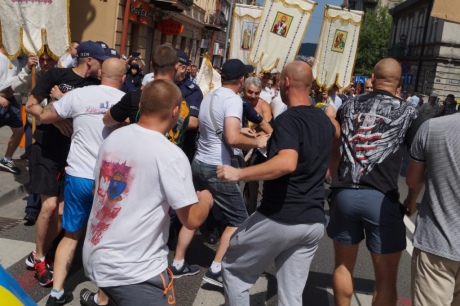
“The commemorations dedicated to our heroes, The Sich Riflemen Halych-Bukovyna Kurin, date back to the 20th
years of the XX century, with a break for the period of the Second Polish Republic. However, it has never sparked controversies. Only now some groups cynically use the fact that the graves of UPA warriors are at the same cemetery and try to provoke a Polish-Ukrainian conflict,” Petro Tyma, the Head of the Association of Ukrainians of Poland, commented, the Polish Radio reports.
Tyma, who was present during the clashes, said that some of the attackers wore T-shirts of the nationalistic All-Polish Youth organization and were shouting offensive slogans. Another witness that the Polish Radio quoted told about local hooligans, so-called preudo-football fans, as well as persons that self-identify with the nationalistic groups. They were holding posters saying “Banderovites and their supporters – out of Poland!”.
A few days later, on July 2, the Ukrainian minority in Przemysl was planning to celebrate a traditional Ukrainian Ivana Kupala Day and invited a Ukrainian band Ot Vinta. However, the concert was banned. Representatives of the Association of the football fans of the “Polonia” team wrote a letter to the city mayor claiming that the band glorifies OUN-UPA. As a proof, the authors of the letter used photos of the band’s leader Yuriy Zhuravel and members of the band by the monument to Stepan Bandera and with the red-black flag on the background. Some nationalist activists even threatened to burn the stage, so Przemysl city mayor Robert Choma decided to ban the concert and cancel the festival.
Ukrainian band Ot Vinta banned from entering Poland
Thus, Ukrainians who live in Poland decided to invite Ot Vinta to Warsaw – the concert was planned in the center of Polish capital on 3 July. The musicians spent over 9 hours at the Ukrainian-Polish border to learn they were banned from entering the country, while their fans faced furious protesters at the place where the concert was planned. According to the note of the Polish Border Guard, the musicians present danger for the political regime and public order. The order came directly from the Ministry of Internal affairs.
“This is a very personal and emotional thing to me,” Yuriy Zhuravel from Ot Vinta later told Polish Newsweek. “My family comes from Volyn. The topic of Volyn has been long used as a bargaining chip both in Ukraine and Poland. That is a lack of respect to the scale of that tragedy. We remember Polish-Ukrainian history and try to draw conclusions from it so that the same mistakes aren’t repeated twice. I believe that it is historians who need to deal with it, on both sides. There is a huge difference between a thorough analysis of a historian and opening wounds and unleashing hatred.”
Organizers of the concert in Warsaw, knowing that Ot Vinta were stuck at the border and banned, brought another Ukrainian band, Joryj Kloc from Lviv. The band and the audience had to deal with representatives of Polish nationalist groups shouting anti-Ukrainian slogans and wearing symbols of Falanga National Radical Camp.

